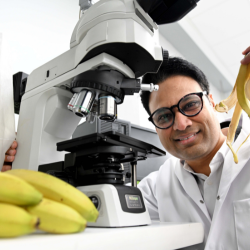-
Study
-
UCAS Clearing 2024
- Clearing Courses
- The Clearing Process
- UCAS Tariff Points
- Clearing 2024 FAQs
- Confirmation
- Clearing Virtual Event
-
Undergraduate
- Search for a Course
- Undergraduate Open Day & Events
- Application Guides
- Northumbria University UCAS Exhibitions
- Foundation Years
- Undergraduate Fees & Funding
- School & College Outreach
- Continuing Professional Development
-
Postgraduate
- Postgraduate Study Degree
- Postgraduate Research Degrees
- Postgraduate Open Days and Events
- Postgraduate Fees & Funding
- Flexible Learning
- Thinking about a Masters?
- Continuing Professional Development
- Change Direction
-
Student Life
- The Hub - Student Blog
- Accommodation
- Life in Newcastle
- Support for Students
- Careers
- Information for Parents
- Students' Union
- Northumbria Sport
-
-
International
International
Northumbria’s global footprint touches every continent across the world, through our global partnerships across 17 institutions in 10 countries, to our 277,000 strong alumni community and 150 recruitment partners – we prepare our students for the challenges of tomorrow. Discover more about how to join Northumbria’s global family or our partnerships.
View our Global Footprint-
Applying to Northumbria
- European Union
- Our London Campus
- Northumbria Pathway
- International Events
- Entry Requirements and Country Representatives
- Regional Offices
-
Northumbria Language Centre
- Faculty Requirements
- Acceptable English Requirements
- Pre-Sessional English and Study Skills
- Academic Language Skills Programmes (ALS)
-
International Fees, Funding & Scholarships
- International Undergraduate Fees
- International Undergraduate Funding
- International Masters Fees
- International Masters Funding
- International Postgraduate Research Fees
- International Postgraduate Research Funding
- International Money Matters
-
Life at Northumbria
- International student support
- Careers
-
International Mobility
- Current Northumbria Students
- Incoming Exchange Students
-
-
Business
Business
The world is changing faster than ever before. The future is there to be won by organisations who find ways to turn today's possibilities into tomorrows competitive edge. In a connected world, collaboration can be the key to success.
More on our Business Services -
Research
Research
Northumbria is a research-rich, business-focused, professional university with a global reputation for academic quality. We conduct ground-breaking research that is responsive to the science & technology, health & well being, economic and social and arts & cultural needs for the communities
Discover more about our Research -
About Us
-
About Northumbria
- Our Strategy
- Our Staff
- Place and Partnerships
- Student Profiles
- Alumni Profiles
- Leadership & Governance
- Academic Departments
- University Services
- History of Northumbria
- Contact us
- Online Shop
-
-
Alumni
Alumni
Northumbria University is renowned for the calibre of its business-ready graduates. Our alumni network has over 237,000 graduates based in 178 countries worldwide in a range of sectors, our alumni are making a real impact on the world.
Our Alumni - Work For Us
What will I learn on this module?
You will learn the basic principles of molecular biology and gain an understanding of how the many different modern techniques can be applied to understanding genetics at the level of the nucleic acids - deoxyribonucleic acid (DNA) and ribonucleic acid (RNA). You will learn why and how DNA and RNA can be manipulated in the laboratory in order to clone and sequence DNA, and produce useful proteins. In addition, you will gain practical experience in representative molecular biology methods and understanding in the context in which they are used. You will also learn how mutations in DNA can lead to human disease and discover the techniques that have been developed to identify normal and mutant DNA sequences in complex mixtures. There will be a focus on the use of molecular biology in understanding human genetics, in particular the diagnosis of disease at the chromosome and nucleic acid levels, and also the methods used for testing and screening for genetic susceptibility. You will learn how techniques have been developed to sequence the human genome and to identify individuals based on features within their DNA. The broader influence of molecular biology in non-human species will be included in your learning using examples of applied genetics.
How will I learn on this module?
You will be taught through a combination of lectures and practical classes. The theoretical basis of each technique will be explained in lectures, and appropriate examples of molecular biology applied to research or diagnostic procedures will be given. Where appropriate, the historical evolution of the techniques will be explained to illustrate good scientific thinking and methodology. You will be expected to reinforce your learning in lectures with extensive background reading and you will be encouraged to discuss your understanding of the topics with your peer group. The practical sessions will give you hands-on experience of key molecular biology procedures and their associated data analysis.
How will I be supported academically on this module?
You will be provided with access to lecture notes and other supporting material via the electronic learning portal (eLP, Blackboard Ultra) where you will be kept up to date with the organisation of lectures and practical sessions. These will complement electronic timetables that can be accessed at any time via the University’s timetabling provision. You also will be supported by a team of lecturers and technical staff who will respond to your queries in a timely and professional manner. Lecturers will provide opportunities for you to ask questions regarding the academic content of lectures during or immediately following lecture sessions and there will be extensive opportunities for you to discuss practical issues during timetabled practical sessions. Staff can be contacted outside of sessions directly or indirectly to deal with queries.
What will I be expected to read on this module?
All modules at Northumbria include a range of reading materials that students are expected to engage with. The reading list for this module can be found at: http://readinglists.northumbria.ac.uk
(Reading List service online guide for academic staff this containing contact details for the Reading List team – http://library.northumbria.ac.uk/readinglists)
What will I be expected to achieve?
Knowledge & Understanding:
1. You will gain knowledge of fundamental molecular biology principles.
2. You will understand how molecular biology has been applied to advance the knowledge of genetics.
Intellectual / Professional skills & abilities:
3. You will gain practical experience in molecular biology techniques.
4. You will demonstrate a professional approach to safe laboratory working.
Personal Values Attributes (Global / Cultural awareness, Ethics, Curiosity) (PVA):
5. You will learn to appreciate the ethical issues surrounding the genome projects.
How will I be assessed?
Specific knowledge and understanding of molecular biology and genetics will be assessed by an online (eLP) exam involving multiple choice questions and receive a summative mark (MLOs 1, 2, 3, 4 tested), weighted 50%.
Coursework will involve the interpretation of applied genetics data by an online (eLP) assessment and receive a summative mark (MLOs 1, 2, 5 tested), weighted 50%.
Pre-requisite(s)
AP0404, AP0406 and (AP0407 OR AP0415)
Co-requisite(s)
For Biomedical and Biology Programmes only - Principles of Cellular and Bio-molecular Analysis, Biology of Disease
Module abstract
Molecular biology is the study of cellular processes at the molecular level using a range of techniques to analyse and manipulate nucleic acids such as deoxyribonucleic acid (DNA) and ribonucleic acid (RNA). Since the flow of genetic information in cells passes from DNA to RNA to proteins, the subject is also concerned with methods for studying protein function and producing useful proteins by engineering DNA. Molecular biology is intrinsically linked to genetics, and application of the techniques in bioscience research and diagnostics has led to many discoveries of value to scientists and society. The module delivers research evidence-based examples and offers the opportunity for students to gain practical experience of the techniques in state-of-the-art facilities that will provide students with a skill set sought by research laboratories and employers.
Course info
UCAS Code F115
Credits 20
Level of Study Undergraduate
Mode of Study 3 years Full Time or 4 years with a placement (sandwich)/study abroad
Department Applied Sciences
Location City Campus, Northumbria University
City Newcastle
Start September 2024 or September 2025
All information is accurate at the time of sharing.
Full time Courses are primarily delivered via on-campus face to face learning but could include elements of online learning. Most courses run as planned and as promoted on our website and via our marketing materials, but if there are any substantial changes (as determined by the Competition and Markets Authority) to a course or there is the potential that course may be withdrawn, we will notify all affected applicants as soon as possible with advice and guidance regarding their options. It is also important to be aware that optional modules listed on course pages may be subject to change depending on uptake numbers each year.
Contact time is subject to increase or decrease in line with possible restrictions imposed by the government or the University in the interest of maintaining the health and safety and wellbeing of students, staff, and visitors if this is deemed necessary in future.
Useful Links
Find out about our distinctive approach at
www.northumbria.ac.uk/exp
Admissions Terms and Conditions
northumbria.ac.uk/terms
Fees and Funding
northumbria.ac.uk/fees
Admissions Policy
northumbria.ac.uk/adpolicy
Admissions Complaints Policy
northumbria.ac.uk/complaints














